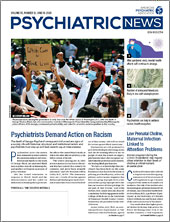During a virtual congressional briefing last month, APA President Jeffrey Geller, M.D., M.P.H., and members of APA’s Committee on Telepsychiatry emphasized the need for expanded access to mental health care through telehealth not only during the COVID-19 pandemic, but afterward as well.
The briefing, titled “Collective Crisis: Preparing for America’s Next Wave of Mental Health and Substance Use Disorder Needs With Telehealth,” was hosted by APA and the National Alliance on Mental Illness (NAMI). The panel included Peter Yellowlees, M.B.B.S., M.D., a professor of psychiatry and chief wellness officer at UC Davis; Shabana Khan, M.D., director of telemedicine for the Child Psychiatry Department at NYU Langone Health; and Jodi Kwarciany, manager of mental health policy at NAMI.
Rep. Bill Johnson (R-Ohio) and Rep. Paul Tonko (D-N.Y.) also made remarks during the briefing. Johnson is one of the sponsors of the CONNECT Act (HR 4932), which would expand access to telehealth services for mental health treatment. Tonko recently worked on a bipartisan letter to House and Senate leaders asking them to extend tele-mental health services beyond the COVID-19 emergency.
Geller commended Congress and the Trump administration for taking steps to reduce barriers to telepsychiatry, such as allowing Medicare beneficiaries to receive treatment at home and through audio-only appointments when necessary. “The evidence is clear that psychiatric care provided by telehealth is as effective as in-person psychiatric services,” he said. He urged lawmakers to make some of these changes permanent, including the following:
•
Remove geographic restrictions on tele-mental health care.
•
Allow patients to receive treatment via telehealth in their homes, as the CONNECT Act does.
•
Waive the Ryan Haight Act requirement that stipulates any physician issuing a controlled substance must conduct an initial, in-person medical evaluation.
•
Allow audio-only telehealth care when appropriate.
Yellowlees and Khan, both members of APA’s Committee on Telepsychiatry, shared stories about how the loosening of telehealth regulations has helped them reach more patients and continue care for others during the pandemic.
Yellowlees described one patient, a physician diagnosed with bipolar disorder, who has been able to avoid hospitalization thanks to being able to meet regularly from his home with Yellowlees through telehealth. Yellowlees also ran a series of groups via videoconferencing technology for surgeons who were concerned about access to personal protective equipment (PPE) and their capacity to operate safely.
“The surgeons were working and living all over the place,” Yellowlees said. “Some were at work, some were at home, some were staying outside of their homes to separate from their families. Simply put, these groups wouldn’t have been possible without video.”
He also uses video technolgy to seepatients in nursing homes. “I think we really need to think very seriously about equipping all nursing homes in this country with good video equipment and access to physicians,” he said.
“I hope that it’s very clear to people that the reduction of these regulations has been really very positive,” he continued. He implored all the participants in the meeting “to do their best to maintain this current situation long term.”
Khan explained the requirement for an initial in-person examination before prescribing controlled substances has been a big hurdle for her and her colleagues when delivering telehealth services. She pointed out that attention-deficit/hyperactivity disorder is a common condition that child and adolescent psychiatrists treat, and stimulant medications are the first-line, evidence-based treatment. However, due to a requirement in the Ryan Haight Act, many individuals who need this treatment must have an initial in-person evaluation before being prescribed a controlled substance. “Traveling to do that initial evaluation is not always feasible,” she said.
Some patients, such as those with autism spectrum disorder, are more comfortable opening up over telehealth. “What we’ve found is that individuals who have a significant amount of anxiety may feel more comfortable with the distance that this technology affords them,” Khan said.
Kwarciany noted that the pandemic is causing symptoms related to anxiety, depression, and substance use disorders to rise, but it also has allowed for change and innovation to connect patients with care in a very short time. “It’s really critical that we keep this momentum going; maintain a lot of these existing flexibilities; … and pressure policymakers to address these barriers across locations, populations, and forms of coverage so that everyone can receive the right care at the right time.”
During the briefing, Geller shared a story about a patient whom he has seen for 30 years. The patient hadn’t spoken to anyone except his brother and Geller since his parents died 20 years ago. He has no interest in computers and spends his time sequestered at home, listening to records.
But since the COVID-19 pandemic began, Geller said he is able to speak with this patient on the phone and make some medication adjustments. “What I have found with him and several other patients is that they actually are able to talk more easily when they’re not face to face,” he said.
As the pandemic continues, the need for greater access to mental and substance use disorder treatment will only rise, Geller said. “We need expanded access to these services to help individuals with the trauma of COVID-19 itself, as well as its impact on economic factors and everyday life stressors,” he said. ■

